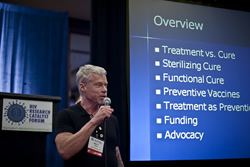The Making of the HIV Research Catalyst Forum

Matt Sharp discusses the quest for a cure.
After a five-year hiatus, NATAF (North American AIDS Treatment Action Forum), a community conference focused on HIV treatment and prevention research has re-emerged onto the national scene.
Renamed the HIV Research Catalyst Forum and organized by TAG and many allied agencies, the 2010 HIV Research Catalyst Forum took place in April in Baltimore.
In 1995, the original NATAF met during a heady time in AIDS research activism. The first protease inhibitor was nearing FDA approval, and combination therapy was about to fundamentally change the course of the HIV epidemic. Treatment activists were witnessing hard won victories, manifest in their lives and the lives of people around them. The possibility of eradication was on everyone’s lips, a preventive vaccine seemingly just around the corner. The NATAF conference organizers took on the challenge of translating these research advances to communities around the country, through treatment education and advocating for public policies to ensure access. Looking back, it must have been hard to imagine that this meeting would still be needed fifteen years later.
In the years since the first NATAF, the AIDS epidemic has marched on relentlessly. Researchers are not getting closer to a cure or a vaccine. Transmission rates defied our best behavioral interventions. Available drugs were increasingly seen as “good enough,” and life-long therapy an acceptable reality. Treatment uptake slumped under the weight of rising drug costs and political indifference. Long-time survivors, including many leading activists, started dying from non-AIDS defining co-morbidities.
While these challenges multiplied in number and complexity, a parallel revolution in how people access and use information, define their communities, and organize advocacy took place. Those crowded weeknight meetings with xeroxed journal articles and face-to-face debate that gave birth to AIDS research activism are gone — along with the sense of urgency that brought people to those weekly meetings and demonstrations. We have lost the camaraderie, the mentoring, and the shared optimism at the core of research activism.
In planning for this year’s HIV Research Catalyst Forum, TAG and our allies set out to reignite that sense of optimism, while recognizing the new possibilities and challenges of grassroots organizing in the year 2010.
Today there are well-established national virtual networks of advocates working on treatment and prevention research, and highly professionalized organizations with well defined missions and staff capacity.There is also a palpable void created by NATAF’s five year absence — a focus on the importance of community driven research activism.The goal of the Catalyst Forum was to replicate some of the key components critical in the success of the original AIDS activist movement: transfer of knowledge and experience to engage new activists; provision of support and guidance in navigating the complex research landscape; and formation of a cohesive sense of community and the power it bestowed.
With initial funding provided by the Office of AIDS Research of the National Institutes of Health, and additional support from non-profit organizations and industry, an online scholarship form was launched to assess the interest for a research focused meeting in the community, as well as to gauge the level of awareness in treatment and prevention research issues. Any doubts about interest for this meeting was put to rest by the nearly 900 applications that came in from around the country. A close look at the applications revealed much passion and commitment in staying the fight against AIDS, but simultaneously a disconcerting lack of understanding and awareness on the important role research plays in that fight. Whether this is due to NATAF’s absence, the gradual erosion of the value of community activists limited to personalities and individual testimonials, or some other factor, it was clear that an issue-oriented and skills-based activist movement driven by community perspectives should be an important outcome for the conference.
A program committee composed of leading activists was charged to tackle these challenging goals. The resulting program consisted of various session formats to engage attendees through a rigorous process of information gathering, skills building, critical analysis, problem solving, and strategy development. With a faculty to participant ratio of 1:3, a wide spectrum of cutting edge prevention and treatment research challenges were presented and studied. A shared desire by the planners to avoid hosting another conference where the energy and momentum dissipates after attendees return home, both formal and informal networking opportunities were sprinkled throughout the proceedings. The four-day meeting ended with recruitment stations for advocacy networks to absorb the 250 attendees into ongoing work, and a rousing closing plenary emphasizing the importance of community research advocacy from a researcher’s perspective was powerfully delivered by Drs. Vicki Cargill and Bob Fullilove.
Recognizing the unique advantages provided by the digital environment for organizing the research advocacy community, including access to the target audience, efficient information delivery and collection mechanisms, and networking opportunities, the conference website and blog was positioned at the nexus of various organizing activities. HIVResearchCatalystForum.org became the home base, where scholarship applications and post-conference evaluations were conducted, presentation slides and web casts were posted, advocacy networks and research resources were linked, and advocacy sign-on letters were hosted. Daily feedback from attendees on their experiences via the conference blog gave people unable to attend a taste of the proceedings.
A blog is not the same as sitting in an old ACT UP meeting slogging through research articles — but if the overwhelmingly positive participant feedback is any indication, the first HIV Research Catalyst Forum has reinvigorated some of the passion and motivation at the heart of this movement. For a more detailed report on the Catalyst Forum and its outcomes, please visit: www.hivresearchcatalystforum.org/report.
